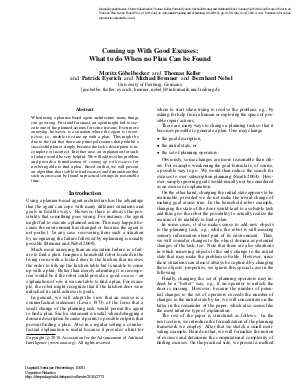Coming up With Good Excuses: What to do When no Plan Can be Found
Authors Moritz Göbeldecker, Thomas Keller, Patrick Eyerich, Michael Brenner, Bernhard Nebel
-
Part of:
Volume:
Dagstuhl Seminar Proceedings, Volume 10081
Part of: Series: Dagstuhl Seminar Proceedings (DagSemProc) - License:
 Creative Commons Attribution 4.0 International license
Creative Commons Attribution 4.0 International license
- Publication Date: 2010-10-27
File

PDF
DagSemProc.10081.7.pdf
- Filesize: 201 kB
- 8 pages
Document Identifiers
Subject Classification
Keywords
- Planning
- knowledge representation
Metrics
- Access Statistics
-
Total Accesses (updated on a weekly basis)
0Document
0Metadata
Abstract
can go wrong. First and foremost, an agent might fail to execute one of the planned actions for some reasons. Even more annoying, however, is a situation where the agent is incompetent, i.e., unable to come up with a plan. This might be due to the fact that there are principal reasons that prohibit a successful plan or simply because the task’s description is incomplete or incorrect. In either case, an explanation for such a failure would be very helpful. We will address this problem and provide a formalization of coming up with excuses for not being able to find a plan. Based on that, we will present an algorithm that is able to find excuses and demonstrate that such excuses can be found in practical settings in reasonable time.
Cite As Get BibTex
Moritz Göbeldecker, Thomas Keller, Patrick Eyerich, Michael Brenner, and Bernhard Nebel. Coming up With Good Excuses: What to do When no Plan Can be Found. In Cognitive Robotics. Dagstuhl Seminar Proceedings, Volume 10081, pp. 1-8, Schloss Dagstuhl – Leibniz-Zentrum für Informatik (2010)
https://doi.org/10.4230/DagSemProc.10081.7
BibTex
@InProceedings{gobeldecker_et_al:DagSemProc.10081.7,
author = {G\"{o}beldecker, Moritz and Keller, Thomas and Eyerich, Patrick and Brenner, Michael and Nebel, Bernhard},
title = {{Coming up With Good Excuses: What to do When no Plan Can be Found}},
booktitle = {Cognitive Robotics},
pages = {1--8},
series = {Dagstuhl Seminar Proceedings (DagSemProc)},
ISSN = {1862-4405},
year = {2010},
volume = {10081},
editor = {Gerhard Lakemeyer and Hector J. Levesque and Fiora Pirri},
publisher = {Schloss Dagstuhl -- Leibniz-Zentrum f{\"u}r Informatik},
address = {Dagstuhl, Germany},
URL = {https://drops.dagstuhl.de/entities/document/10.4230/DagSemProc.10081.7},
URN = {urn:nbn:de:0030-drops-27739},
doi = {10.4230/DagSemProc.10081.7},
annote = {Keywords: Planning, knowledge representation}
}
